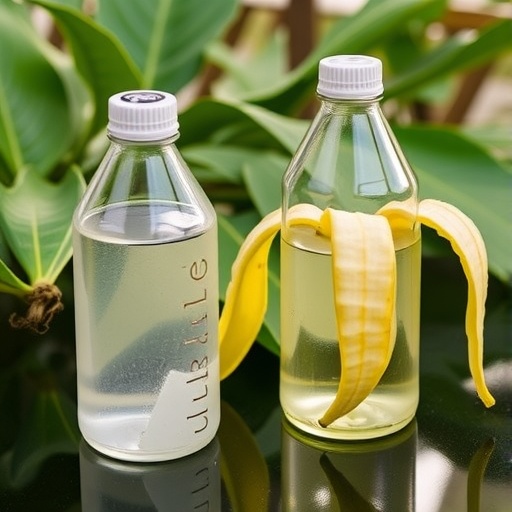In a groundbreaking study that could revolutionize waste management practices and bioethanol production, researchers have explored the enzymatic valorization of raw banana peels using a specialized bacterium, Bacillus sp. SA-45. This innovative approach holds great promise for generating bioethanol, a vital alternative energy source, while also addressing the challenges of waste disposal and environmental impact. The findings, published in a recent article in Waste Biomass Valor, demonstrate the potential of employing biological processes for both economic and ecological benefits.
The study investigates the enzymatic breakdown of banana peels, a commonly discarded agricultural byproduct, into valuable bioethanol. As the world grapples with the ever-increasing dilemma of food waste and the urgent need for sustainable energy solutions, this research presents a dual approach that not only produces energy but also contributes to waste reduction. The use of banana peels is particularly intriguing due to their abundance and often overlooked potential in the circular economy.
To effectively assess the viability of Bacillus sp. SA-45 in bioethanol production, the research team employed a series of fermentation processes tailored to optimize the enzymatic conversion of carbohydrates in banana peels. This selection of Bacillus sp. SA-45 was based on its robust enzymatic profile, which is crucial for breaking down the complex polysaccharides found in plant materials. The findings from this study indicate a significant increase in bioethanol yield, marking a critical advancement in the quest for alternative fuels derived from renewable resources.
The research also delves into the operational mechanics of the fermentation process. By harnessing the natural capabilities of Bacillus sp. SA-45, the team has developed a methodology that maximizes the conversion rate of sugars into bioethanol. This methodological innovation involves adjusting parameters such as temperature, pH levels, and fermentation time, creating an environment conducive to optimal microbial activity. This refined process significantly elevates the feasibility of large-scale bioethanol production from banana peels, which is crucial for commercial applications.
In addition to the technical achievements, the environmental implications of this research cannot be overstated. The production of bioethanol from banana peels not only reduces the volume of organic waste that would otherwise contribute to environmental degradation but also provides a carbon-neutral energy source. As a renewable fuel, bioethanol generated from agricultural waste can play a pivotal role in achieving a sustainable energy future, aligning with global goals for reducing greenhouse gas emissions and transitioning towards cleaner energy systems.
The conversion of waste materials into energy is a fundamental principle of the circular economy, and this study exemplifies that principle in action. By utilizing banana peels, a resource often deemed valueless, the researchers highlight the importance of rethinking waste as a potential asset. This innovative perspective is essential for developing more sustainable agricultural practices that promote the efficient use of resources and minimize environmental impact.
The researchers also emphasized the scalability of their process. The results obtained from laboratory-scale experiments are promising, but the real challenge lies in transferring this method to industrial applications. The ability to utilize existing agricultural infrastructure for large-scale production of bioethanol could significantly lower costs and increase the feasibility of such sustainable initiatives. Bacillus sp. SA-45 has emerged as a key player in this transition, and further studies will likely focus on optimizing conditions for commercial viability.
Moreover, the findings suggest that the sustainable production of bioethanol could bolster local economies, particularly in regions heavily reliant on banana cultivation. By creating a market for banana peels, farmers can gain additional revenue streams while contributing to environmental sustainability. This economic incentive could encourage more farmers to adopt practices that prioritize waste recovery and the utilization of byproducts, fostering a culture of sustainability within agricultural communities.
The broader implications for public health and safety are noteworthy as well. Bioethanol derived from Bacillus sp. SA-45 can be applied in surface sterilization, offering a potential solution for disinfecting surfaces in various settings. As the demand for effective sterilization methods grows, particularly in response to global health crises, exploring innovative uses for bioethanol may open new avenues for ensuring public safety.
With increasing awareness of climate change and environmental issues, the significance of developing alternative energy sources like bioethanol is becoming increasingly urgent. This study contributes significantly to the body of work surrounding renewable energy, providing a clear path forward for future research in microbial fermentation technologies. A focus on leveraging waste materials for energy production can lead to breakthroughs that not only aid in energy independence but also promote ecological stewardship.
The researchers noted the importance of interdisciplinary collaboration in achieving these breakthroughs. By combining the expertise of microbiologists, environmental scientists, and agricultural specialists, the study showcases how diverse scientific perspectives can generate innovative solutions for complex problems. This collaborative approach can inspire future research endeavors, highlighting the importance of tackling challenges holistically.
In conclusion, the fermentative enzymatic valorization of banana peels using Bacillus sp. SA-45 represents a promising advancement in the field of sustainable energy production. This innovative research not only has the potential to transform waste management but also aligns with global sustainability efforts. As we continue to seek viable alternatives to traditional fossil fuels, studies like this serve as a reminder of the untapped potential present in our agricultural byproducts. The fusion of science, sustainability, and economic opportunity encapsulated in this research paves the way for a more environmentally friendly future.
Subject of Research: Enzymatic valorization of banana peels for bioethanol production
Article Title: Fermentative Enzymatic Valorization of Raw Banana Peels Using Bacillus sp. SA-45 for Generation of Bioethanol for Surface Sterilization
Article References:
Shahab, A., Izhar, S.K., Rizvi, S.F. et al. Fermentative Enzymatic Valorization of Raw Banana Peels Using Bacillus sp. SA-45 for Generation of Bioethanol for Surface Sterilization. Waste Biomass Valor(2025). https://doi.org/10.1007/s12649-025-03347-4
Image Credits: AI Generated
DOI:
Keywords: Bioethanol, Waste Valorization, Bacillus sp. SA-45, Sustainable Energy, Circular Economy
Tags: agricultural byproducts for biofuelsBacillus sp. SA-45 fermentation processesbanana peels bioethanol productionbiological processes for energycircular economy and food wasteecological benefits of bioethanolenvironmental impact of biofuelsenzymatic valorization of wasteoptimized carbohydrate conversionrenewable energy from wastesustainable energy solutionswaste management practices innovation





